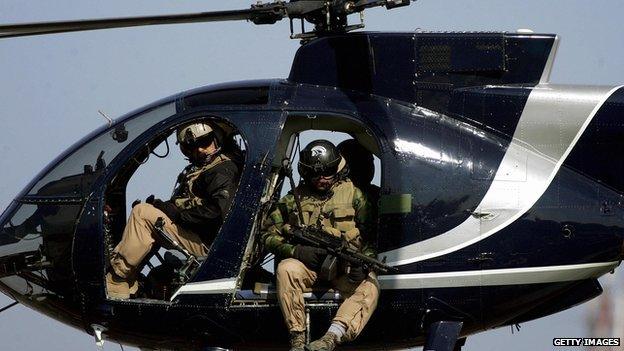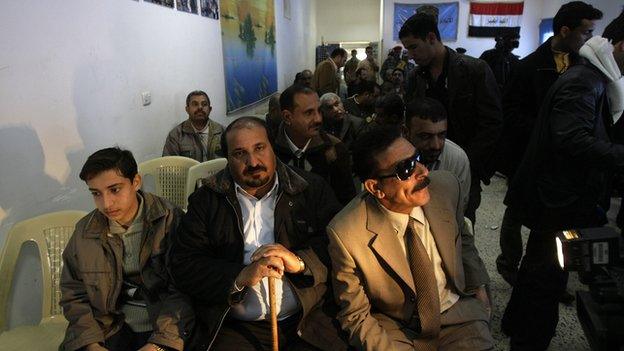A Blackwater official threatened to kill a government investigator
- Published
- comments

On Monday New York Times reporter James Risen published a 2,000-word article, external on Blackwater Worldwide, a private security company that received more than a billion dollars in government contracts to provide protection to US personnel in Iraq.
He paints a portrait of a company whose employees, from the top down, considered themselves above the law - engaging in reckless, threatening behaviour with a disregard for written procedures and civilian safety.
Although Blackwater has since been sold, renamed and merged with a competitor, the company's actions during the US occupation of Iraq have been in the news lately, as four employees are standing trial in the killing of 17 Iraqi civilians in Baghdad's Nisour Square on 16 September, 2007.
Risen's article was based on a report, external written by a US state department investigator sent to Iraq several weeks before the Baghdad incident to look into allegations of abuses and reckless behaviour by Blackwater guards.
According to Risen, the investigators observed numerous violation of government rules, including reducing the number of guards assigned to missions, storing weapons in unsafe locations, using unauthorised firearms, poorly maintained vehicles, providing poor work conditions for foreign contract workers, drinking heavily and "partying with frequent female visitors".
On 21 August, 2007, the two state department investigators - Jean C Richter and Donald Thomas Jr - met with Daniel Carroll, Blackwater's Iraq project manager, and a US embassy official to discuss their findings.
The meeting turned acrimonious. Mr Richter described what happened next:
Mr Carroll said "that he could kill me at that very moment and no one could or would do anything about it as we were in Iraq," Mr Richter wrote in a memo to senior State Department officials in Washington. He noted that Mr Carroll had formerly served with Navy SEAL Team 6, an elite unit.
"Mr Carroll's statement was made in a low, even tone of voice, his head was slightly lowered; his eyes were fixed on mine," Mr Richter stated in his memo. "I took Mr Carroll's threat seriously. We were in a combat zone where things can happen quite unexpectedly, especially when issues involve potentially negative impacts on a lucrative security contract."

Nicholas Slatten is one of four Blackwater former employees accused of killing Iraqi civilians in 2007
Following the confrontation, US embassy officials ordered Mr Richter and Mr Thomas to return to the US and terminated their investigation:
On Aug. 23, Ricardo Colon, the acting regional security officer at the embassy, wrote in an email that Mr Richter and Mr Thomas had become "unsustainably disruptive to day-to-day operations and created an unnecessarily hostile environment for a number of contract personnel."
In his article, Risen details Blackwater's history and rise to prominence as a company founded by former US Navy Seal Erik Prince.
Mr Prince, Risen writes, contributed to a company culture characterised by hubris and a disregard of authority. At one point, he says, the Blackwater founder ordered his employees to take an "oath of allegiance" to the company.
The response to Risen's article has been one of outrage and amazement.
"Blackwater operated during the Iraq War with a sense that they were untouchable because - well, because they were," writes, external the Daily Beast's Tim Mak.
MSNBC's Steve Benen is incredulous, external:
The state department wanted to get a better sense of Blackwater's operations in Iraq, which led a Blackwater manager to not only resist but to actually threaten the life of a State Department investigator - and the US Embassy sided with Blackwater?
"It's a scene that sounds like it was written for a corny TV show about war," writes, external Vanity Fair's Kia Makarechi.
The Week's Ryan Cooper says, external the Blackwater allegations are just another example of the "drunken colonialism" that typified the US experience in Iraq.
"These swaggering, heavily armed goons were disturbingly reminiscent of colonial police forces," he writes.
The US-run Coalition Provisional Authority was like a colonial government, he said, and the occupying forces played rival militias off each other in a strategy that was "straight out of the colonial handbook".
He concludes:
Of course, the war in Iraq wasn't intended as a colonialist project. But the lesson here is that any effort to rule another nation by force, no matter how noble those intentions might be, will increasingly develop a colonialist character. And like many a colonialist effort, the invasion of Iraq was doomed from the start.
As Vox's Dara Lind writes, external, Blackwater's operations in Iraq, and the Nisour Square shootings in particular, cast a dark shadow on negotiations over a status of forces agreement for maintaining a US troop presence in Iraq as it began to withdraw the bulk of its forces.
The four employees accused of killing Iraqi civilians were granted immunity from Iraqi law - and the Iraq government wanted to rescind that privilege for any remaining US soldiers.
"That's particularly relevant today, as the Iraqi government is struggling to fight an insurgency led by the Islamic State of Iraq and the Levant (Isis)," she writes.
- Published18 June 2014

- Published3 October 2018